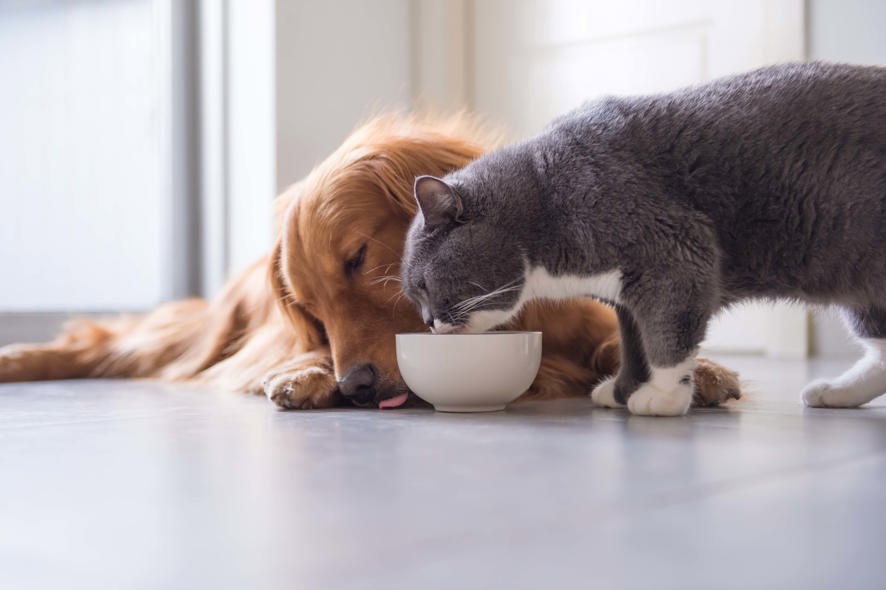Understanding Digestive Issues in Your Cats & Dogs
- Health
- Dog
Dogs and puppies tend to eat whatever they find lying around, so it is no wonder they vomit or that their stool changes from time to time. Cats are more cautious by nature, but may still have digestive troubles.

What are the causes of digestive issues and when should we, as pet owners, worry? Here is some information that will help you understand your dogs’ and cats’ tummy troubles!
Digestive troubles in dogs
Constipation
An unbalanced diet, a sudden change in food, a dull coat or a lack of physical activity all cause constipation in dogs. They will feel pain and have bloated bellies. If constipation is temporary, there is no cause to worry. If it persists, however, it can become dangerous.
Diarrhea
There are many causes of diarrhea in dogs, and most are benign. They include a rapid change in food, food poisoning, poisoning and allergies. Diarrhea is frequent, liquid stools. However, if it persists, a more serious problem (i.e. illness) may be the root cause.
Vomiting
Like diarrhea, vomiting in dogs is usually mild. Sometimes they just ate too much. However, if vomiting is accompanied by a personality shift, fever, abdominal pain or weight loss, it is advisable to take action as soon as possible.
Digestive troubles in cats
Constipation
Like humans, cats can suffer from intestinal transit issues and have difficulty evacuating their stool. The cause of constipation in cats is often harmless: they tend not to drink enough water. However, sometimes their constipation can become more serious and cause them pain or bleeding.
Diarrhea
Whether acute or chronic, diarrhea is unpleasant for both the cat and their humans! Acute diarrhea with sudden onset can result from poisoning, disease, ingestion of spoiled food, parasites or viral infections.
Chronic cat diarrhea can be caused by stress, disease or thickening of the cat’s intestinal walls.
Vomiting
Occasional vomiting in cats is quite normal and should not be cause for concern. Vomiting sometimes occurs after eating catnip or due to the infamous hairballs that can form in cat intestines. When cats groom their fur, they ingest hair that can clump and cause digestive troubles, like intestinal obstructions, constipation, vomiting or diarrhea. If vomiting is frequent, however, it is time to be concerned because cats get dehydrated very quickly when they vomit.
Chronic vomiting in cats can be caused by disease, spoiled food or poisoning.
What should you do if your pet shows these symptoms?
If your dog or cat suffers from vomiting or diarrhea for more than 24 hours, you should consult your veterinarian as soon as possible. The vet may conduct tests to make an appropriate diagnosis and treatment plan. Since vomiting and diarrhea dehydrate your pets quickly, these symptoms should not be taken lightly. Do not wait for a common condition to become fatal!
For occasional constipation, simply identifying the cause and treating it quickly can be enough to restore your pet’s intestinal transit. If constipation persists, a visit to the veterinarian is called for. The vet will prescribe the necessary care, whether medication, supplements or even a change of diet.
How can you help your pet have good digestion?
- A healthy, balanced and good-quality diet will make sure your pet has good intestinal transit. Offering your pets probiotic-rich food helps them absorb all the nutrients they need. It is also important to know that the fattier the food, the more difficult it will be to digest. If your pet has digestive issues, you should prioritize kibble made with chicken, turkey or fish, which are low-fat proteins.
- Make sure your pets always have a bowl of fresh water and that they drink frequently. Investing in a playful water fountain may encourage your cat to drink a little more.
- Make sure your pet is getting enough exercise.
- Keep spoiled food out of reach.
Does your dog or cat have vomiting, diarrhea or constipation? Be it temporary or long lasting, these symptoms should never be taken lightly. Consult your vet.